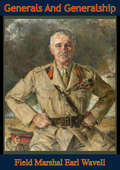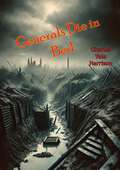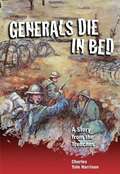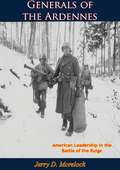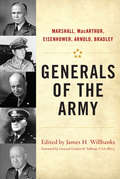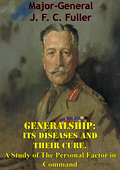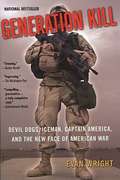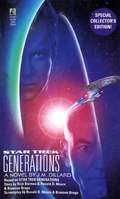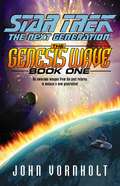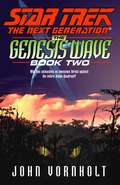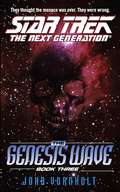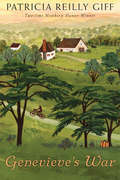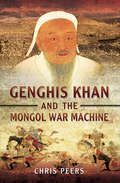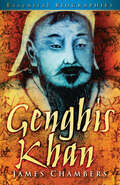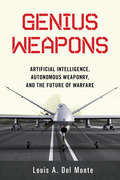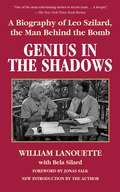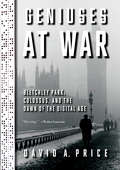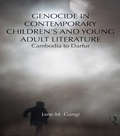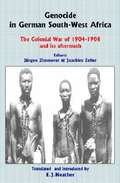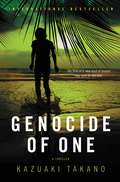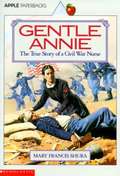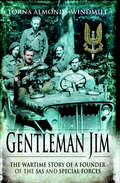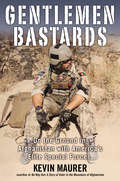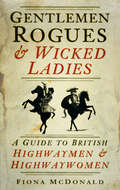- Table View
- List View
Generals And Generalship
by Field-Marshal Earl Wavell Field Marshal Sir John DillField Marshal Wavell was one of the most successful British Army commanders of the Second World War, often given the toughest assignments, usually greatly outnumbered and with few resources. In this short volume he shares the distilled wisdom on the qualities, mental, moral and political that are necessary for successful leadership.A long forgotten classic of military thought and leadership."These lectures by General Wavell [...] show very clearly how he and the army under his direction have gained their great victories in Africa and why they will gain others. For these lectures, though delivered over two years ago, could only have been delivered by a man capable of winning and keeping the confidence of all men in all walks of life. They deal with the relationships between man and man, on which must be founded both the success of an army and the success of a whole nation at war. I am glad indeed to think that they will have a wide audience, and particularly among soldiers, for whom they have deep lessons."--From Foreword by Field Marshal John Dill
Generals Die in Bed: 100th Anniversary Of World War I Special Edition
by Charles Yale HarrisonGenerals Die in Bed by Charles Yale Harrison is a harrowing and unflinchingly realistic portrayal of the brutal realities of trench warfare during World War I. Drawing on his own experiences as a soldier, Harrison delivers a powerful anti-war narrative that strips away the romanticism often associated with war, revealing the raw and devastating impact of combat on the ordinary soldiers who fight and die on the front lines.Set in the muddy, blood-soaked trenches of the Western Front, Generals Die in Bed follows a young, unnamed Canadian soldier as he endures the relentless horrors of war. Through his eyes, readers are confronted with the grim realities of life in the trenches—constant danger, crushing fatigue, the omnipresent threat of death, and the profound sense of disillusionment that permeates the ranks. Harrison’s writing is stark and unsentimental, capturing the futility and senselessness of a conflict that destroys lives without meaning or purpose.The title, Generals Die in Bed, serves as a bitter commentary on the disconnect between the front-line soldiers and the generals who command them from a distance, often safe from the carnage that their decisions create. Harrison’s narrative challenges the glorification of military leadership, exposing the tragic irony that while soldiers face unimaginable hardships and often die anonymously in the mud, the generals who direct the battles are spared the physical and emotional toll of combat.This book is a timeless and essential read for anyone interested in the human cost of war. Harrison’s Generals Die in Bed stands alongside other classic works of World War I literature, such as All Quiet on the Western Front, as a searing indictment of the horrors of war and a tribute to the soldiers who, despite everything, endure.With its vivid descriptions and haunting insights, Generals Die in Bed remains a poignant and powerful reminder of the true nature of warfare, making it a significant contribution to the literature of the Great War.
Generals Die in Bed: A Story from the Trenches
by Charles Yale HarrisonGenerals die in bed, while soldiers die in the trenches, horrifically, unimaginably, infested with lice and surrounded by rats fattened on corpses. There are no rules, no expectations in war. And there is certainly no glamour. Instead, the men inhabit a senseless world, trusting only the instinct to stay alive. Based on his own experiences in the First World War, Charles Yale Harrison writes a stark and poignant story from the point of view of a young man sent to fight on the Western Front. Beginning in Montreal, the scene soon shifts from the cheering crowds, streamers, and music of the farewell parade to the stench of the trenches, where the soldiers meticulously divide up the stale, gray "war" bread and rationed sugar for their weak tea. In stark, graphic detail, Harrison writes of the soldiers' fear as the crumbling dirt walls of the palisade tumble down upon them during a shell attack. He recounts the horror of face-to-face combat, where the enemy is revealed to be a smooth-skinned lad, no different from the boy down the street. He shows compassion for both the killer and the killed, each innocent, in a situation without choice. In raw, powerful prose, the insanity of war is shown clearly as Harrison questions the meaning of heroism, of truth, and of good and evil. The First World War may seem distant and irrelevant to many young people today, but it is a timeless and important lesson. Seen through the eyes of the adolescent narrator, the experience of trench warfare takes on renewed vibrancy as readers identify with the plight of the youthful soldiers. Harrison's vivid account is a valuable resource for all teachers and students of history and of the human condition. An introduction places Generals Die In Bed in its proper literary context, beside All Quiet on the Western Front and A Farewell to Arms. Harrison's concise, blunt writing style is an effective means of conveying the reality of war and an example to students of literature. Originally published in 1930, this book was lauded as "the best of the war books" by the New York Evening Standard.
Generals of the Ardennes: American Leadership in the Battle of the Bulge
by Jerry D. MorelockIn the many decades since the German army smashed into the American lines in the Battle of the Bulge, opinion of the U.S. senior command's leadership capabilities has fluctuated between hero worship and scorn, with the latter view becoming more predominant as the initial glow of victory faded. Rather than a conventional study of the Ardennes offensive, "Generals of the Ardennes: American Leadership in the Battle of the Bulge" studies five examples of American command leadership at different levels to answer two questions: what characteristics of leadership did these generals display, and how did they affect the overall battle? Based on extensive documentation and personal interviews with participants, "Generals of the Ardennes" provides a description and analysis of: Dwight Eisenhower's role as coalition commander; Omar Bradley's direction of the 12th Army Group during the crisis; Lieutenant General William Simpson's contribution to the Ninth Army's part in defeating the German onslaught; Major General Troy Middleton's stand with the VIII Corps in the center of the fighting; Major General Alan Jones and Brigadier General Bruce Clarke and how they dealt with the challenges and confusions at "the point of the spear." Amid the countless books in many languages that tell and retell the history of the Battle of the Bulge, this one is unique in its focus on American generalship during those epic and decisive weeks that turned the tide of World War II in Europe. For that reason, it stands as both a significant history and an important document for the study of command and control.
Generals of the Army: Marshall, MacArthur, Eisenhower, Arnold, Bradley (American Warriors Series)
by James H. Willbanks&“A concise account of the extraordinary careers of the five men who had perhaps the greatest impact on the US military of the late twentieth century.&” —Andrew Wiest, author of The Boys of &’67: Charlie Company&’s War in Vietnam Formally titled &“General of the Army,&” the five-star general is the highest possible rank awarded in the U.S. Army in modern times and has been awarded to only five men in the nation&’s history: George C. Marshall, Douglas MacArthur, Dwight D. Eisenhower, Henry H. Arnold, and Omar N. Bradley. In addition to their rank, these distinguished soldiers all shared the experience of serving or studying at Fort Leavenworth, Kansas, where they gained the knowledge that would prepare them for command during World War II and the Korean War. In Generals of the Army, James H. Willbanks assembles top military historians to examine the connection between the institution and the success of these exceptional men. Historically known as the &“intellectual center of the Army,&” Fort Leavenworth is the oldest active Army post west of Washington, D.C., and one of the most important military installations in the United States. Though there are many biographies of the five-star generals, this innovative study offers a fresh perspective by illuminating the ways in which these legendary figures influenced and were influenced by Leavenworth. This concise volume offers an intriguing look at the lives of these remarkable men and the contributions they made to the defense of the nation. &“An excellent review of the lives and challenges, on and off the battlefield, during trying times for our country.&” —Ike Skelton, Former Chairman, House Armed Services Committee, US Congress
Generalship: Its Diseases and Their Cure. A Study of The Personal Factor in Command
by Major-General J. F. C. FullerThe seminal treatise on Generalship, by Major-General Fuller, reputed to have been the most formative book in General Patton's military training which he kept with him at all times."IN the summer of 1921 I was lunching at the Restaurant la Rue with the Deputy Chief of the French General staff when he told me the following story:At the battle of Waterloo, Colonel Clement, an infantry commander, fought with the most conspicuous bravery; but unfortunately was shot through the head. Napoleon, hearing of his gallantry and misfortune, gave instructions for him to be carried into a farm where Larrey the surgeon-general was operating.One glance convinced Larrey that his case was desperate, so taking up a saw he removed the top of his skull and placed his brains on the table.Just as he had finished, in rushed an aide-de-camp, shouting: 'Is General Clement here?'Clement, hearing him, sat up and exclaimed: 'No! but Colonel Clement is.''Oh, mon général,' cried the aide-de-camp, embracing him, 'the Emperor was overwhelmed when we heard of your gallantry, and has promoted you on the field of battle to the rank of General,'Clement rubbed his eyes, got off the table, clapped the top of his skull on his head and was about to leave the farm, when Larrey shouted after him: 'Mon général--your brains!' To which the gallant Frenchman, increasing his speed, shouted back: 'Now that I am a general I shall no longer require them!'In this modest study, my object is to prove that, though Clement was wrong about brains, without his courage there can be no true generalship."-Foreword.
Generation Kill: Devil Dogs, Iceman, Captain America, And The New Face Of American War (Playaway Adult Nonfiction Ser.)
by Evan WrightRead Evan Wright's posts on the Penguin Blog.Read about the Penguin Group (USA) partnership with HBO in support of the Generation Kill Troop Drive here.They were called a generation without heroes.Then they were called upon to be heroes.Within hours of 9/11, America's war on terrorism fell to those like the twenty-three Marines of the First Recon Battalion, the first generation dispatched into open-ended combat since Vietnam. They were a new pop-culture breed of American warrior unrecognizable to their forebears--soldiers raised on hip hop, video games and The Real World. Cocky, brave, headstrong, wary and mostly unprepared for the physical, emotional and moral horrors ahead, the "First Suicide Battalion" would spearhead the blitzkrieg on Iraq, and fight against the hardest resistance Saddam had to offer.Now a major HBO event, Generation Kill is the national bestselling book based on the National Magazine Award-winning story in Rolling Stone. It is the funny, frightening, and profane firsthand account of these remarkable men, of the personal toll of victory, and of the randomness, brutality and camaraderie of a new American War.
Generations: Star Trek The Next Generation (Star Trek #No.40)
by J.M. DillardThe story begins with the launching of the U.S.S. Enterprise NCC-1701-B and the mysterious disappearance of Captain James T. Kirk. Then seventy-eight years later, Captain Jean-Luc Picard of the U.S.S. Enterprise NCC-1701-D receives a distress call from a remote scientific observatory. Picard learns that a newly developed super weapon has been stolen by a desperate scientist with an insane plot. Facing the most difficult task of his career, Captain Picard must seek out the one person with the power to help him, a person long thought dead: Captain James T. Kirk. Together, the two captains will be tested as they've never been before. And both men will be forced to make the greatest sacrifices of their careers to save countless millions from a madman with a plan for mass destruction.
Genesis (Gateway Essentials #9)
by Poul AndersonArtificial intelligence has been developed to a point where human intelligence can be uploaded into a computer, achieving a sort of hybrid immortality. Astronaut Christian Brannock welcomes this technology that will make it possible for him to achieve his dream and explore the stars.A billion years later, Brannock is dispatched to Earth to check on some strange anomalies. While there he meets Laurinda Ashcroft, another hybrid upload. Brannock and Laurinda join forces and investigate Gaia, the supermind dominating the planet, and learn the truth of her terrifying and secret plans for Earth...Winner of the John W. Campbell Award for best novel, 2001
Genesis Wave: Star Trek The Next Generation (Star Trek: The Next Generation)
by John VornholtIntended to create life from nothingness, the Genesis Device had the potential to become a weapon of awe-inspiring destructiveness, capable of rearranging matter and life energy on a planetary scale. After the cataclysmic explosion of the Genesis Planet, and the Klingon Empire's attempt to steal the top-secret technology for its own military purposes, Starfleet wisely decided to destroy all data and records on Project Genesis, hoping to bury its deadly secrets forever. Nearly a century later, all that remains of Genesis is the knowledge stored in the mind of an elderly, almost-forgotten scientist namedDr. Carol Marcus. But Dr. Marcus has gone missing, and a menace from bygone days has come rushing back with a vengeance. Sweeping across the Alpha Quadrant at a terrifying speed, a mysterious wave of energy is wiping out populations of entire planets, rearranging matter on a molecular level to create bizarre new landscapes and life-forms. The Starship Enterprise , commanded by Captain Jean-Luc Picard, is the first Starfleet vessel to discover the threat, but Picard and his crew are not the only ones in danger. Billions of living beings and hundreds of inhabited planets lie in the path of the mutagenic wave, which is expanding outward as it traverses the cosmos. Earth and the Romulan Empire face total obliteration. To discover the origin of the wave, Picard and his crew must probe the long-buried mysteries of the past. But even if he can uncover the shocking history of the Genesis Wave, is there any way to save the future from its unleashed fury? The Genesis Wave, Book One, is the beginning of an apocalyptic two-part adventure that will pit the desperate crew of the Starship Enterprise against a disaster of galactic proportions.
Genesis Wave: Star Trek The Next Generation (Star Trek: The Next Generation)
by John VornholtThe spectacular conclusion to the thrilling double-sized adventure! Like an unstoppable cosmic storm, the dreaded Genesis Wave continues to sweep across the Alpha Quadrant, transforming entire planets on a molecular level and threatening entire civilizations with extinction. Based on the long-hidden scientific secrets of Dr. Carol Marcus, who has mysteriously disappeared, the wave of mutagenic protomatter seems to have come from nowhere, posing a cataclysmic menace to life as we know it. To combat the rushing terror of the wave, Captain Jean-Luc Picard and the crew of the Starship Enterprise have been forced into an uneasy alliance with both the Klingons and the Romulan Empire, both of whom may crave the forbidden secrets of the Genesis technology for themselves. The finest engineers of three civilizations, including Geordi La Forge and his long-lost love, Dr. Leah Brahms, must race against time to devise some way of halting the deadly wave before yet another world is transformed into something entirely alien and unrecognizable. But even if, against all odds, the Genesis Wave can be defeated, Picard and his potentially treacherous allies must still confront the greater mystery of what unknown intelligence dared to launch the wave against an unsuspecting galaxy -- and for what malevolent purpose....
Genesis Wave: Star Trek The Next Generation (Star Trek: The Next Generation)
by John Vornholt"As a matter of cosmic history, it has always been easier to destroy than to create." -- Spock, The Wrath of Khan Sweeping across the Alpha Quadrant at a terrifying speed, a wave of Genesis energy has wiped out whole populations of entire planets, rearranging matter on a molecular level to create bizarre new landscapes and life-forms. The U.S.S. Enterprise , commanded by Captain Jean-Luc Picard, managed to counter the threat, halting the wave in its tracks and stopping the alien race that had sent the wave crashing through the galaxy. In the process the crew saved trillions of souls and hundreds of inhabited planets from the mutagenic wave. Earth itself, as well as the Romulan Empire, was saved from obliteration. Now nothing is left to do but clean up the mess the Genesis Wave left behind. Or so it seems. Unknown to Picard and his crew, the use of the Genesis Wave on a galactic scale had weakened the walls between our dimension and one right next door, one that harbors a deadly threat to not only the survival of civilization throughout the galaxy, but the survival of reality itself. The Genesis Wave, Book Three, is the final volume of an apocalyptic adventure that pits the desperate crew of the Starship Enterprise against a disaster of universal proportions.
Genevieve's War
by Patricia Reilly Giff Becca StadtlanderThirteen-year-old American girl Genevieve has spent the summer of 1939 at her grandmother’s farm in Alsace, France. Then she makes an impulsive choice: to stay in France. It proves to be a dangerous decision. World War II erupts. The Nazis conquer Alsace and deport the Jews and others. A frightening German officer commandeers a room in Meme’s farmhouse. And when Gen’s friend Remi commits an act of sabotage, Gen is forced to hide him in the attic—right above the Nazi officer’s head. Genevieve’s War is a gripping story that brings the war in occupied France vividly to life. It is a companion work to Lily’s Crossing, a Newbery Honor Book.
Genghis Khan and the Mongol War Machine
by Chris PeersThe military might, tactics, and philosophy of Khan is explored in this “fine read” and “useful source for Mongolian . . . and medieval studies in general” (De Re Militari). As a soldier, general, statesman, and empire-builder, Genghis Khan is a near-mythical figure. His remarkable achievements and his ruthless methods have given rise to a monstrous reputation. But who was the man behind the legend? As historian Chris Peers shows in this concise and authoritative study, Genghis Khan possessed exceptional gifts as a leader and manager of men—ranking among the greatest military commanders in history. But he can only be properly understood in terms of the Mongol society and traditions he was born into. Here, the leader’s world is explored—from the military and cultural background of the Mongols, to the nature of steppe societies and their armies, and their relation to other peoples and cultures. The book also looks in detail at the military skills, tactics, and ethos of the Mongol soldiers, and at the advantages and disadvantages they had in combat with the soldiers of other civilizations. For anyone who wants to go beyond the myth of the man who almost conquered the world and learn the real life story behind it, this comprehensive study offers a fascinating perspective on Genghis Khan as a man and a general, and on the armies he led.
Genghis Khan: Essential Biographies
by James ChambersGenghis Khan, the thirteenth century emperor, was infamous for his bloodthirsty, ruthless campaigns, but he was also one of the great commanders of history. Though a master of terror – his campaigns in northern China and Iran were accompanied by a level of slaughter that was not seen again until the twentieth century – he was just and generous to his subjects and often magnanimous in victory. His broad, ambitious strategies and elusive tactics were so far ahead of their time that they were acknowledged models for some of the most successful tank commanders of the Second World War. At the beginning of the thirteenth century Genghis Khan united the nomad tribes of Mongolia, turned them into a formidable army and led them to rule over the largest empire ever conquered by a single commander. By the time he died, in 1227, his dominions stretched eastward from the Caspian Sea to the shores of the Pacific Ocean.
Genius Weapons: Artificial Intelligence, Autonomous Weaponry, and the Future of Warfare
by Louis A. Del MonteA technology expert describes the ever-increasing role of artificial intelligence in weapons development, the ethical dilemmas these weapons pose, and the potential threat to humanity.Artificial intelligence is playing an ever-increasing role in military weapon systems. Going beyond the bomb-carrying drones used in the Afghan war, the Pentagon is now in a race with China and Russia to develop "lethal autonomous weapon systems" (LAWS). In this eye-opening overview, a physicist, technology expert, and former Honeywell executive examines the advantages and the potential threats to humanity resulting from the deployment of completely autonomous weapon systems. Stressing the likelihood that these weapons will be available in the coming decades, the author raises key questions about how the world will be impacted. Though using robotic systems might lessen military casualties in a conflict, one major concern is: Should we allow machines to make life-and-death decisions in battle? Other areas of concern include the following: Who would be accountable for the actions of completely autonomous weapons--the programmer, the machine itself, or the country that deploys LAWS? When warfare becomes just a matter of technology, will war become more probable, edging humanity closer to annihilation? What if AI technology reaches a "singularity level" so that our weapons are controlled by an intelligence exceeding human intelligence?Using vivid scenarios that immerse the reader in the ethical dilemmas and existential threats posed by lethal autonomous weapon systems, the book reveals that the dystopian visions of such movies as The Terminator and I, Robot may become a frightening reality in the near future. The author concludes with concrete recommendations, founded in historical precedent, to control this new arms race.
Genius in the Shadows: A Biography of Leo Szilard, the Man Behind the Bomb
by William Lanouette Bela SilardWell-known names such as Albert Einstein, Enrico Fermi, J. Robert Oppenheimer, and Edward Teller are usually those that surround the creation of the atom bomb. One name that is rarely mentioned is Leo Szilard, known in scientific circles as "father of the atom bomb." The man who first developed the idea of harnessing energy from nuclear chain reactions, he is curiously buried with barely a trace in the history of this well-known and controversial topic.Born in Hungary and educated in Berlin, he escaped Hitler's Germany in 1933 and that first year developed his concept of nuclear chain reactions. In order to prevent Nazi scientists from stealing his ideas, he kept his theories secret, until he and Albert Einstein pressed the US government to research atomic reactions and designed the first nuclear reactor. Though he started his career out lobbying for civilian control of atomic energy, he concluded it with founding, in 1962, the first political action committee for arms control, the Council for a Livable World.Besides his career in atomic energy, he also studied biology and sparked ideas that won others the Nobel Prize. The Salk Institute for Biological Studies in La Jolla, California, where Szilard spent his final days, was developed from his concepts to blend science and social issues.
Geniuses at War: Bletchley Park, Colossus, and the Dawn of the Digital Age
by David A. PriceThe dramatic, untold story of the brilliant team whose feats of innovation and engineering created the world&’s first digital electronic computer—decrypting the Nazis&’ toughest code, helping bring an end to WWII, and ushering in the information age.Planning the invasion of Normandy, the Allies knew that decoding the communications of the Nazi high command was imperative for its success. But standing in their way was an encryption machine they called Tunny (British English for &“tuna&”), which was vastly more difficult to crack than the infamous Enigma cipher. To surmount this seemingly impossible challenge, Alan Turing, the Enigma codebreaker, brought in a maverick English working-class engineer named Tommy Flowers who devised the ingenious, daring, and controversial plan to build a machine that would calculate at breathtaking speed and break the code in nearly real time. Together with the pioneering mathematician Max Newman, Flowers and his team produced—against the odds, the clock, and a resistant leadership—Colossus, the world&’s first digital electronic computer, the machine that would help bring the war to an end. Drawing upon recently declassified sources, David A. Price&’s Geniuses at War tells, for the first time, the full mesmerizing story of the great minds behind Colossus and chronicles the remarkable feats of engineering genius that marked the dawn of the digital age.
Genocide in Contemporary Children's and Young Adult Literature: Cambodia to Darfur (Children's Literature and Culture)
by Jane GangiThis book studies children’s and young adult literature of genocide since 1945, considering issues of representation and using postcolonial theory to provide both literary analysis and implications for educating the young. Many of the authors visited accurately and authentically portray the genocide about which they write; others perpetuate stereotypes or otherwise distort, demean, or oversimplify. In this focus on young people’s literature of specific genocides, Gangi profiles and critiques works on the Cambodian genocide (1975-1979); the Iraqi Kurds (1988); the Maya of Guatemala (1981-1983); Bosnia, Kosovo, and Srebrenica (1990s); Rwanda (1994); and Darfur (2003-present). In addition to critical analysis, each chapter also provides historical background based on the work of prominent genocide scholars. To conduct research for the book, Gangi traveled to Bosnia, engaged in conversation with young people from Rwanda, and spoke with scholars who had traveled to or lived in Guatemala and Cambodia. This book analyses the ways contemporary children, typically ages ten and up, are engaged in the study of genocide, and addresses the ways in which child survivors who have witnessed genocide are helped by literature that mirrors their experiences.
Genocide in German South-west Africa: The Colonial War of 1904-1908 and Its Aftermath
by Joachim Zeller Jürgen Zimmerer Edward NeatherThe 1904 war that broke out in present day Namibia after the Herero tribe rose against an oppressive colonial regime--and the German army's brutal suppression of that uprising--are the focus of this collection of essays. Exploring the annihilation of both the Herero and Nama people, this selection from prominent researchers of German imperialism considers many aspects of the war and shows how racism, concentration camps, and genocide in the German colony foreshadow Hitler's Third Reich war crimes.
Genocide of One: A Thriller
by Philip Gabriel Kazuaki TakanoThe internationally bestselling, award-winning Japanese thriller about a child who may be the future of the human race--or the cause of its extinction.During a briefing in Washington D.C., the President is informed of a threat to national security: a three-year-old boy named Akili, who is already the smartest being on the planet. Representing the next step in human evolution, Akili can perceive patterns and predict future events better than most supercomputers, and is capable of manipulating grand-scale events like pieces on a chess board. And yet, for all that power, Akili has the emotional maturity of a child--which might make him the most dangerous threat humanity has ever faced.An American soldier, Jonathan Yeager, leads an international team of elite operatives deep into the heart of the Congolese jungle under Presidential orders to destroy this threat to humanity before Akili's full potential can be realized. But Yeager has a very sick child, and Akili's advanced knowledge of all things, medicine included, may be Yeager's only hope for saving his son's life. Soon Yeager finds himself caught between following his orders and saving a creature with a hidden agenda, who plans to either save humanity as we know it--or destroy it.
Gentle Annie: The True Story of a Civil War Nurse
by Mary Francis ShuraA fictionalized biography of Anna Blair Ethridge, a Union Army nurse.
Gentleman Jim: The Wartime Story of a Founder of the SAS & Special Forces
by Lorna Almonds Almonds-WindmillThe remarkable story of Jim Almonds, his WWII experiences, and his formative role in the birth of the SAS. Set in wartime England, the western desert, Italy, and France, this book captures the spirit of the young soldiers in the newly emerging Special Air Service, against a dramatic background of love, courage, and high-risk adventure. Jim Almonds, a sergeant in the Guards Commandos, sailed for the Middle East as part of “Layforce” in January 1941, with David Stirling and others destined to become SAS L Detachment “originals.” Following intensive training in the desert and action at Tobruk, Sidi Haneish, Nofelia, and Benghazi, Almonds was captured and shipped to a POW camp in Italy, where he staged two escapes. After thirty-two days on the run in enemy territory, he reached US forces at the Benevento front line. Later, he parachuted into occupied France, where he harried the Germans so effectively that he was awarded the Croix de Guerre. Written by Gentleman Jim’s daughter and based on Almond’s own diaries, various primary sources, and interviews with other originals, this is a story about an extraordinary man, filled with vivid and immediate action.
Gentlemen Bastards
by Kevin MaurerThe Green Berets--a legendary corps of soldiers whose exploits made military history. But now, its very identity and role as a fighting force may be forever changed . . . Until the war in Iraq, Special Forces were the military's counterinsurgency experts. Their specialty was going behind enemy lines and training insurgent forces. In Afghanistan, they toppled the Taliban by transforming Northern Alliance fighters into cohesive units. But since that time, Special Forces units have focused on offensive raids.With time running short, the Green Berets have now gone back to their roots.Award-winning journalist Kevin Maurer traveled with a Special Forces team in Afghanistan, finding out firsthand the inside story of the lives of this elite group of highly trained soldiers. He witnessed the intense brotherhood, the rigorous selection process, and the arduous training that makes them the best on the battlefield. Here, Maurer delivers a compelling account of modern warfare and of a fighting force that is doing everything in its power to achieve victory.
Gentlemen Rogues and Wicked Ladies: A Guide to British Highwaymen and Highwaywomen
by Fiona McDonaldEveryone loves a romantic rogue whose exciting exploits feature a cheeky disregard for the law, narrow escapes and lots of love interest. Even at the height of highway robbery activity in the eighteenth century, it was thought that the death penalty was too harsh for these wayward scoundrels. There was the ever-courteous Claude Duval, the epitome of gentlemanliness; the infamous Katherine Ferrers, who was the inspiration for the film The Wicked Lady; Dick Turpin, the most famous highwayman of them all; and lesser-known characters such as Tom Rowland, who dressed as a woman to avoid capture. All these and more form an entertaining volume that follows the mounted thief in their endless match against the law and a death by public hanging.
